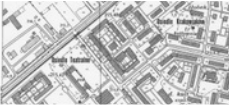|
Małgorzata Strzyż
Tworzenie Smart City a usługi krajobrazowe na przykładzie miasta Kielce Creating a Smart City along with landscape services based on the example of the city of Kielce Urban Development Issues, vol. 72(2), 04. https://doi.org/10.51733/udi.2021.72.2.04
Słowa kluczowe: bazy danych, bazy danych referencyjnych i tematycznych, krajobraz, usługi krajobrazowe, inteligentne miasto smart city, strategia rozwoju miasta, Kielce
Keywords: databases, reference and thematic databases, landscape, landscape services, smart city, city development strategy, Kielce |
ABSTRAKT
Koncepcja tworzenia inteligentnego miasta Smart City w przypadku istniejących już od setek lat ośrodków miejskich wymaga, w początkowej fazie tworzenia inteligentnego miasta, stworzenia zbiorów danych danego ośrodka miejskiego i jego otoczenia zewnętrznego w celu utworzenia baz referencyjnych o określonej tematyce. Istotnym elementem inwentaryzacji istniejącego potencjału rozwojowego miasta jest również określenie jego potencjału krajobrazowego, w tym realne możliwości wykorzystania potencjału usług krajobrazowych. Usługi te stanowią nową formę utylitarnego zastosowania badań krajobrazowych jako kompleksowego podejścia do badania potencjału rozwojowego środowiska miejskiego na poziomie podstawowym. Na przykładzie miasta Kielce dokonano analizy możliwości rozwoju koncepcji Smart City w warunkach wykorzystania potencjału usług krajobrazowych.
Koncepcja tworzenia inteligentnego miasta Smart City w przypadku istniejących już od setek lat ośrodków miejskich wymaga, w początkowej fazie tworzenia inteligentnego miasta, stworzenia zbiorów danych danego ośrodka miejskiego i jego otoczenia zewnętrznego w celu utworzenia baz referencyjnych o określonej tematyce. Istotnym elementem inwentaryzacji istniejącego potencjału rozwojowego miasta jest również określenie jego potencjału krajobrazowego, w tym realne możliwości wykorzystania potencjału usług krajobrazowych. Usługi te stanowią nową formę utylitarnego zastosowania badań krajobrazowych jako kompleksowego podejścia do badania potencjału rozwojowego środowiska miejskiego na poziomie podstawowym. Na przykładzie miasta Kielce dokonano analizy możliwości rozwoju koncepcji Smart City w warunkach wykorzystania potencjału usług krajobrazowych.
ABSTRACT
The concept of creating a smart city in case of the urban centres that have been existing for hundreds of years, requires, at the initial stage of creating a so-called smart city, the establishment of data collections of a particular city centre and its external surroundings in order to create reference databases dealing with a specific topic. The establishment of its landscape potential, including the existent possibilities of using the potential of landscape services also appears to be an important constituent of the inventory in the range of the existing city development potential. These services reveal a new form of the utilitarian application of the landscape research as a holistic approach to studying the development potential of the urban environment on the basic level. Based on the example of the city of Kielce, the eventual prospects of developing the concept of a so-called Smart City were analysed in respect to using the potential of landscape services.
The concept of creating a smart city in case of the urban centres that have been existing for hundreds of years, requires, at the initial stage of creating a so-called smart city, the establishment of data collections of a particular city centre and its external surroundings in order to create reference databases dealing with a specific topic. The establishment of its landscape potential, including the existent possibilities of using the potential of landscape services also appears to be an important constituent of the inventory in the range of the existing city development potential. These services reveal a new form of the utilitarian application of the landscape research as a holistic approach to studying the development potential of the urban environment on the basic level. Based on the example of the city of Kielce, the eventual prospects of developing the concept of a so-called Smart City were analysed in respect to using the potential of landscape services.

